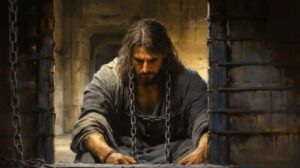filter posts:
Date
Author
These Things Should Mark Us
In reprimanding those who depend on their good works for salvation, Paul counters with a picture
of what a Christian is to do. He wrote that we are to worship by the Spirit of God, glory in Christ
Jesus, and put no confidence in the flesh.
When you think of worship, don’t think “standing at your pew, singing worship songs.” That’s only
a small part of worship. To become a worshipper means that our direction and our affections are
changed, not just for a few minutes on Sunday and not just in a certain location, but all the time
and in every place. Jesus teaches us that worship is not a service or a religious ceremony. It is not
dependent on a place or a liturgy or smells or bells. Worship is what Christians cannot help but do
all the time, because the Spirit of God has moved in and taken over. I saw a picture several years
ago when I visited with Hilda at Twin Lakes. She was 94, a widow, and a wonderful woman of God
who blessed me every time I went to see her. Hilda was not able to attend church, but boy, did she
love Jesus, and she talked to him all day long. She said once with a wink, “I tell the Lord, ‘Now, if I
am asking too much, you tell me!’”
“Glory in Christ Jesus.” That’s what Hilda was doing. This is just a natural outflow for those who
worship by the Spirit of God, because the work of the Spirit is to glorify the Son.
“Put no confidence in the flesh.” How can we survey the wondrous cross on which the Prince of
glory died, and then pat ourselves on the back? Good job reading the Bible this morning! Great
prayer at church, you really knocked that one out of the park! You know gained you some points with
God for sure!
Kind of turns your stomach a little doesn’t it? Beware of becoming the older brother in the story
Jesus told about the prodigal son. The point of the story was not really the penitent prodigal
younger brother, but the proud, pharisaical older brother, whose confidence was in his works,
which made him a stay-at-home prodigal. The older brother, the proud prodigal said in anger to
his father, “Look, these many years I have served you,” while refusing to come in and celebrate
that his brother had come home. Then he said with disgust, “I never disobeyed your command.”
Do you see his ‘religion?’ “Look what I did. Look how many rules I have kept!” Because his
confidence was in his own self-righteousness, he felt justified in being angry with his father, even
accusing his father of not loving him enough. He was a legalist, just like many today who measure
their worth to God, and therefore what He ‘owes’ them, by their own good deeds.
Listen, the flip side is true as well. Many Christians fear God’s disapproval because they constantly
weigh whether they do enough, whether they love enough, whether they serve enough. That’s
prodigal thinking. What brought the prodigal home was not the thought that he really could do
better if he tried harder. No. What brought him home was a confidence that his father would take
him in, even if only as a hired servant. His confidence was in his father, not in his own works. What
a surprise when he was welcomed with a kiss, a ring, shoes, and a robe!
We also can come home every single day with that same expectation and hope, that our Father will
take us in, not because of our pitiful ‘good deeds,’ but because of the work completed by His Son.
February 12, 2024
Make Every Effort to Add These!
 One of the wakeup calls that happened in my life as a teenager was when my dad found out I was regularly skipping school about once a week. He sat me down and said this: “As long as you are living in this house and wearing clothes and eating food that I provide for you, you will go to school and work hard. Every day.” There was an indicative: you are loved and provided for here. And it was connected to an imperative: you will work hard at your calling which, right now, is a student. Peter says something similar to his readers, connecting the indicative to the imperative, because they cannot be separated. He says, because his divine power and precious promises and everything that pertains to life and godliness have been given to you by God…you will make every effort to grow up, become established in the truth, live a godly life, and enjoy the fruit of your relationship with Jesus Christ.
One of the wakeup calls that happened in my life as a teenager was when my dad found out I was regularly skipping school about once a week. He sat me down and said this: “As long as you are living in this house and wearing clothes and eating food that I provide for you, you will go to school and work hard. Every day.” There was an indicative: you are loved and provided for here. And it was connected to an imperative: you will work hard at your calling which, right now, is a student. Peter says something similar to his readers, connecting the indicative to the imperative, because they cannot be separated. He says, because his divine power and precious promises and everything that pertains to life and godliness have been given to you by God…you will make every effort to grow up, become established in the truth, live a godly life, and enjoy the fruit of your relationship with Jesus Christ.
Why do some Christians think that they have to work really hard and sacrifice much to become a better athlete, a valuable employee, a talented musician, or a better spouse…but being a follower of Christ requires little because, “Hey, it’s all good! God loves me!” He does love you. And it is God’s love and Jesus’ ultimate sacrifice that saved us and calls us to grow in character and godliness and good works. The idea is captured by Solomon in Proverbs 24: “I passed by the field of a sluggard, by the vineyard of a man lacking sense, and behold, it was all overgrown with thorns; the ground was covered with nettles, and its stone wall was broken down. Then I saw and considered it; I looked and received instruction. A little sleep, a little slumber, a little folding of the hands to rest, and poverty will come upon you like a robber, and want like an armed man.” Solomon was talking about sloth and the price one pays for laziness in his work. But the same applies to our life as a disciple of Jesus Christ, and that is what Peter addresses.
Make every effort to do these things, Peter writes. Do it now, with haste. This is urgent where other things can wait. Add to your faith these things that will require sacrifice and effort. Remember, saints, your faith to believe was a gift. You did not add that, God did. Grace is a gift that God adds every day, to build our faith and enable us to add these qualities to our faith. Remember, you are not saved by works, but you are saved to works. Why do we need to make every effort to add these qualities to our faith? Peter tells us that it is so we will be effective and fruitful in Jesus!
This list of qualities Peter tells us to work on, are “Not a legalistic code but rather the desires and features of a transformed heart.” (ESV Study Bible) If holiness were as easy as removing a TV from our homes and making sure our wives and daughters only wear dresses (neither of which are evidences of spiritual maturity), then we could all be just about perfect. But this list goes beyond externals and goes into matters of the heart. These qualities require his divine power that he freely gives to all who ask. So what are these qualities we are told to make every effort to add to our faith?
Read them in the first chapter of 2 Peter.
February 5, 2024
That is where we belong
 Where do I belong? Where do I fit in? We all want to know the answer to those questions. For some, it is a lifelong pursuit. I remember my high school days with pain, because I really didn’t know where I fit in. In my school there were five groups. At the top of the food chain were the popular kids. Some were athletes or cheerleaders, others were not. But they were the kids everybody else wanted to be like, and to hang out with. I remember a recurring dream where one of the popular guys would see me carrying my tray in the cafeteria at school, and he would call over to me: “Hey, Fox, come join us!” Then I would wake up.
Where do I belong? Where do I fit in? We all want to know the answer to those questions. For some, it is a lifelong pursuit. I remember my high school days with pain, because I really didn’t know where I fit in. In my school there were five groups. At the top of the food chain were the popular kids. Some were athletes or cheerleaders, others were not. But they were the kids everybody else wanted to be like, and to hang out with. I remember a recurring dream where one of the popular guys would see me carrying my tray in the cafeteria at school, and he would call over to me: “Hey, Fox, come join us!” Then I would wake up.
Next in the pecking order were the jocks. You didn’t have to be the quarterback or the starting point guard, but if you were on the football or basketball team, you were cool and got invited to all the parties. Tennis? Umm, not so much. I played tennis in 9th and 10th grade, and we even won a city championship. But tennis didn’t cut it with the jocks.
The third group was the brainiacs, the smart kids. They were the ones who, if they even bothered to show up at the football game, brought their chemistry book with them. But at least they belonged to a group, and I wasn’t in it.
Then there was the group that we called the druggies, the ones who wore Black Sabbath t-shirts and were always smoking cigarettes in the bathroom and talking about their latest party. Those guys scared me.
Finally, we must not forget about the rednecks. These were the good ol’ boys who drove their pickups to school and backed them into a parking space in the gravel lot. They couldn’t wait for lunch break because they would eat their sandwich and Fritos outside, gathered around one of their trucks, “talking boss,” whatever that meant. I, uh, didn’t have a truck, and didn’t have the nerve to back my dad’s 1967 Oldsmobile Cutlass into a parking space next to them. So, I didn’t fit in with those guys, either.
That was it, the five groups in my school. Oh, wait, there was one more: “others.” That’s where I hung out: with the rest of the losers. And to be honest, that’s where the majority of the Christians fit in. Still do. We are the “other” guys and girls. We ate together, went to church together, and sometimes prayed together early in the morning before school started. And though we knew where we fit in, sort of, mostly we knew where we didn’t fit. I had Christian friends who would have done anything to break into one of the other groups.
Maybe some of you feel that way, whether you are 17 or 37. You are still trying to figure out where you belong. I have great news! All who come to Christ by faith belong to him. We are accepted in the beloved. We are called by Christ to know him and to help others to know him, too. But our citizenship is in heaven; that’s where we will fully and finally and forever belong. I have thought about having a passport made up that says “Heaven” for my citizenship status, but my impression is that the guys at passport control are not known for their sense of humor.
Who are you? Where, really, is your identity found? That question, at least in our culture, is perhaps more confusing than it has ever been. But the Bible makes it plain. Our identity is not found in our race, or our gender, or our politics, or our education, or our athleticism, or our economic status, or our marital status, or our children, or anything else. Our identity is found in Christ: that is where we belong. In Him.
And, you know what? If there’s a football team in heaven, I’m showing up for tryouts with my new and
glorified body.
January 28, 2024
Grow in Grace and Knowledge of Christ
 Peter greets the readers of his second letter with, “to those who have obtained a faith of equal standing,” reminding us of three foundational truths about our faith foundation. First, the faith that we have was obtained. The word picture there is of someone who has received his or her apportioned share of an inheritance. They did not earn it nor do they deserve it. They are the beneficiaries of another’s grace and mercy. God has given us faith, as Paul reminds us in Ephesians 2:8-9, “this is not your own doing; it is the gift of God, not a result of works, so that no one may boast.” Have you seen the commercial where Mr. Marbles the Cat is in the room when the will of his deceased owner is read? The cat is given a lifetime supply of Chewy cat food. He says, “I always loved that old man.” But then it is revealed that Mr. Marbles was also left the summer house. While the family members are groaning in unbelief, Mr. Marbles says, “You got a train set, Todd!” Ok, it’s a commercial. But this verse stirs up my mind by gentle reminder that God’s gift of faith in Christ is better than a whole universe of summer houses or train sets.
Peter greets the readers of his second letter with, “to those who have obtained a faith of equal standing,” reminding us of three foundational truths about our faith foundation. First, the faith that we have was obtained. The word picture there is of someone who has received his or her apportioned share of an inheritance. They did not earn it nor do they deserve it. They are the beneficiaries of another’s grace and mercy. God has given us faith, as Paul reminds us in Ephesians 2:8-9, “this is not your own doing; it is the gift of God, not a result of works, so that no one may boast.” Have you seen the commercial where Mr. Marbles the Cat is in the room when the will of his deceased owner is read? The cat is given a lifetime supply of Chewy cat food. He says, “I always loved that old man.” But then it is revealed that Mr. Marbles was also left the summer house. While the family members are groaning in unbelief, Mr. Marbles says, “You got a train set, Todd!” Ok, it’s a commercial. But this verse stirs up my mind by gentle reminder that God’s gift of faith in Christ is better than a whole universe of summer houses or train sets.
Second, the faith we have obtained is the same faith that the apostles obtained. The New King James Version says, “To those who have obtained like precious faith with us.” Spurgeon wrote, “He tells us too, that faith is ‘precious;’ and is it not precious? For it deals with precious things, with precious promises, with precious blood, with a precious redemption, with all the preciousness of the person of our Lord and Savior Jesus Christ.” The same precious faith that was given to the Jews, Peter says to the elect Gentile believers, was given to you! You have equal standing with us. Every sinner saved by grace has equal standing with every other sinner saved by grace.
Third, we stand on and in “the righteousness of our God and Savior Jesus Christ.” That righteousness was given to us, imputed to us by Christ’s death and resurrection, and we are in Christ because of God’s grace.
Then Peter says, “May grace and peace be multiplied to you in the knowledge of God and of Jesus our Lord.” There is a constant push by those in the world to increase in knowledge without acknowledgement of God, who is the source of knowledge. Or to increase in truth without obedience to the one wo said, “I am the truth.” Or to increase in “faith” without recognizing the only immoveable object of faith, our God and Savior Jesus Christ. If we have knowledge without God or truth without Christ, what good is our faith? I remember when I was training for my first triathlon in my early 50’s and I was a terrible swimmer. Still am. But I went to Beck Pool at Elon a number of times to swim laps because there was hardly ever anybody in the pool. I would start at the deep end and swim to the shallow end, back and forth, trying to get to the conditioning level where I could swim a mile without stopping. Sometimes I would be swimming in near-darkness, early in the morning. What if I had walked in one day when they were doing maintenance on the pool and it was dark and I didn’t know the pool was empty and I dove off the deep end…my faith in water that was not there to hold me up would be as profitable for me as those who believe in knowledge without God and truth with Christ.
May you and I grow in the grace and knowledge of our Lord and Savior Jesus Christ.
January 21, 2024
Only God Can Tame This Beast
What weighs less than two ounces, works almost constantly for 16 hours a day, and cannot be controlled by either man or woman? The mighty tongue. I know what Charles Wesley meant when he wrote “O for a Thousand Tongues to Sing,” but we just couldn’t survive it. 999 of them would be gossiping or backbiting or complaining, while the one would be singing “our great redeemer’s praise.” No thanks, Charles. One is plenty.
A family sat around the table for breakfast one morning. As was his custom, the father prayed and thanked God for the food. Immediately afterwards, as was also his habit, he began to grumble about the food and how it was prepared. His young daughter said, “Daddy, do you think God heard what you said when you thanked Him for the food?” “Certainly,” replied the father with confidence. “And did He hear you when you said bad things about the food?” “Of course,” the father replied, hesitantly. His little girl said, “Daddy, which did God believe?”
James illustrates the power of the tongue to direct, destroy, and to delight (or deceive) in his third chapter. The first word picture compares the tongue to a bit. A bit is put into a horse’s mouth so that a 60-lb kid can direct a 1,000-lb horse. One of my dad’s decisions when I was growing up was to buy a Palomino and keep him pastured offsite. I remember going over to ride Sundance on occasion. Every time I did, the horse would obey my instructions given through the bit and bridle for a little while, and I could set my watch by what happened next. After ten minutes, he would get tired of the whole thing, because he knew somehow that I was really not in charge, and he would take off for the trees. Gaining speed as he got closer, all while I am pulling back on the reins and yelling, Sundance would go straight for the low branches to try to knock me off. That horse was evil. No, he was just like me as a young man, and sometimes as an older man. He did what he wanted to do; he was not going to be controlled by someone else. When the horse submits to the bit, then the rider has control over the horse’s whole body, and the ride is a pleasure for both. So it is with the tongue.
The tongue boasts of great things, James says, and it can be used to direct a nation toward good or evil. On August 20, 1940, Winston Churchill said to the House of Commons, “Never in the field of human conflict was so much owed by so many to so few.” He said this to praise the courage of the Royal Air Force in their ongoing battle against German warplanes engaged in nightly bombings of the city of London. On his way to give the speech that day, Churchill was going over his speech. He had planned to say, “Never in the history of mankind have so many owed so much to so few.” His chief military assistant, Pug Ismay, said, “What about Jesus and His disciples?” Churchill smiled and said, “Good ‘ol Pug,” and he changed his speech, to “Never in the field of human conflict…”
The tongue of one man, Churchill, directed a nation, and gave them courage in the face of an enemy. On the other hand, someone has calculated that for every one word of Hitler’s autobiography, Mein Kampf, 125 lives were lost in WWII.
Only God can tame the tongue.
January 14, 2024
Pursue God
 Augustine said, “You have made us for yourself, O Lord, and our hearts are restless until they rest in you.” We exist to pursue God. And we pursue God if and only because he has put that urge in our hearts. Jesus said, “No one can come to me unless the Father who sent me draws him.” What does it mean to pursue? Interesting first definition in the Oxford American Dictionary for “pursue:” “to chase in order to catch or kill.” We certainly want to have that measure of intentionality and energy in our pursuit of God. Good news, we don’t have to catch him, though, because he has already caught us. We are his and he is ours. But as AW Tozer said, “To have found God and still to pursue him is the soul’s paradox of love.” In other words, our relationship with God is not a static or completed experience but a dynamic, lifelong relationship. The pursuit of God involves a deepening understanding, a growing intimacy, and a continuous commitment to spiritual growth. We do run after him in our desire to know him, hear him, learn from him, walk with him, and be fully his. The Psalmist said it like this: “As a deer pants for flowing streams, so pants my soul for you, O God. My soul thirsts for God, for the living God.” Our hearts are restless and our souls are thirsty because we were made for God, to know him and to be like him, to be a disciple of Jesus Christ.
Augustine said, “You have made us for yourself, O Lord, and our hearts are restless until they rest in you.” We exist to pursue God. And we pursue God if and only because he has put that urge in our hearts. Jesus said, “No one can come to me unless the Father who sent me draws him.” What does it mean to pursue? Interesting first definition in the Oxford American Dictionary for “pursue:” “to chase in order to catch or kill.” We certainly want to have that measure of intentionality and energy in our pursuit of God. Good news, we don’t have to catch him, though, because he has already caught us. We are his and he is ours. But as AW Tozer said, “To have found God and still to pursue him is the soul’s paradox of love.” In other words, our relationship with God is not a static or completed experience but a dynamic, lifelong relationship. The pursuit of God involves a deepening understanding, a growing intimacy, and a continuous commitment to spiritual growth. We do run after him in our desire to know him, hear him, learn from him, walk with him, and be fully his. The Psalmist said it like this: “As a deer pants for flowing streams, so pants my soul for you, O God. My soul thirsts for God, for the living God.” Our hearts are restless and our souls are thirsty because we were made for God, to know him and to be like him, to be a disciple of Jesus Christ.
Jesus invited any who would be his disciples to “deny himself, and take up his cross and follow me.” To pursue Christ, then we must first stop pursuing ourselves. The Greek word here for deny means ‘refuse, repudiate, disown someone or something.’ It is the same word used by Jesus when he said to Peter, “you will deny me three times.” How can the same disciple who said, “You are the Christ,” call down curses on himself at Jesus’ trial and swear, “I never knew the man!” Because the heart is easily given to self-protection. We don’t want to take up our cross. Oswald Chambers said, “All heaven is interested in the cross of Christ, all hell is terribly afraid of it, while men and women are the only beings who more or less ignore its meaning.” The call to take up our cross indicates an absolute claim on the allegiance of the disciple to Jesus, and an absolute surrender of all that one is and all that one has, all of our resources, given gladly to the Lord. We often think of that in metaphorical terms and sing “All to Jesus, I surrender” without blinking. But not the people who first heard this call. The people living in the first century would understand, as James Edwards writes, “that their adversity under Nero was not a sign of abandonment but rather of their identification with and faithfulness to the way of Jesus himself.” When they sang, “All to Jesus, I surrender,” they meant all. Life, limb, reputation, property…all. Billy Graham used to say, “Salvation is free, but discipleship will cost you everything.” But as Jesus said, the one who tries to save his life will lose it but the one who takes up his cross, dies to his self-will and his agenda will find the life he was made for!
Jesus also said to those who would follow him, “For what does it profit a man to gain the whole world and forfeit his soul?” Why would Jesus say this? Because he knows that one of the greatest temptations we face is to substitute a pursuit of material gain, stuff, money and status for the pursuit of God. I pray through part of a list of prayers for pastors and church leaders written by Tim Challies every morning as part of my prayer time. This list is good for anyone to use and pray through. One day a week this one comes up under the heading, “Not a lover of money,” which comes from the list of qualifications for elders in 1 Timothy 3. The prayer goes like this: “I pray……that I would not make material possessions the ambition of my life. … that I would refuse to pursue financial gain above eternal things, preferring to store up treasure in heaven than on earth.… that I would not sacrifice my family or my spiritual health on the “altar” of my job.… that I would not be greedy or covetous, but instead be generous and quick to give to those in need.… that I would give a generous portion of my income to the church and rejoice when doing so.”
Jesus said we cannot serve God and money.
We cannot pursue God if our heart’s greatest treasure is material gain. Or anything or anyone else.
January 7, 2024
Three Prayer Requests
 On January 5 of 2023, I wrote some thoughts about the elders’ prayer service we had the night before. This is where the elders pray over families or singles who ask for it as we enter the new year, and we will do the same at the beginning of 2024. I was struck last year by three recurring prayer requests from the 30 or so households we prayed for that evening and on subsequent Sundays.
On January 5 of 2023, I wrote some thoughts about the elders’ prayer service we had the night before. This is where the elders pray over families or singles who ask for it as we enter the new year, and we will do the same at the beginning of 2024. I was struck last year by three recurring prayer requests from the 30 or so households we prayed for that evening and on subsequent Sundays.
One request that many repeated was, “I want to be able to really read the Bible and not just check the box. I want to better understand what I am reading and grow in my knowledge of God and his word.” I love the heart behind that prayer request and agree with it myself. I don’t want to just read the Bible in the morning because that is part of my routine. I want to be changed by it. Good news on this. First, God said in Isaiah that the fact that his word will change us is as reliable as the fact that rain and snow from heaven water the earth and bring forth fruit. “…so shall my word be that goes out from my mouth; it shall not return to me empty, but it shall accomplish that which I purpose, and shall succeed in the thing for which I sent it.” God is at work as you read the Word, as you share it with your family, as you sit under it on Sundays or at the women’s Bible Study or at home group. And remember, he delights in giving us what we ask for when what we ask for is his will. His will is for us to know him and follow him by living in and walking out his word!
A second recurring prayer request was for sons and daughters who once professed faith but are no longer walking with the Lord. I have never lost a child and cannot imagine the pain and grief that some have suffered. But there are many in churches everywhere who have living sons and daughters who are in the far country. Jesus knew about that, didn’t he? I think our best hope for our sons and daughters who are estranged from the faith is to do what the prodigal’s father did. Though it is not stated, we must believe that he prayed his son would return. And I believe he prayed with hope, with expectation, because when his son did come back, remember what happened? “While he was still a long way off, his father saw him.” Sounds like he was looking for him every day! You know the rest of the story. The father ran to his son to welcome him home. One of the encouragements for me is the knowledge that God holds the heart of kings in his hand, and “he turns it wherever he will.” It is a reminder that there is no way we can force any of our children to follow the Lord. But the Lord holds their hearts in his hand, whether young or old, and he turns them wherever he will. Our job is to pray and to love and to keep looking down that road for them to return.
A third recurring prayer was for boldness in witness. I remember one young man in his teens who asked the elders to pray for him about this. That thrilled my soul. It reminded me of Acts 4 when Peter and John had been arrested and spent a night in prison because they had been preaching Jesus after healing the lame beggar in Jesus’ name. They were brought before the high priest and the rulers and elders and scribes the next morning to give an account of the healing. Peter told them it was Jesus who healed the lame man. Then he added, “And there is salvation in no one else, for there is no other name under heaven given among men by which we must be saved.” You might be thinking, yeah, but this was Peter and John. They were apostles! Read what Luke wrote next in Acts 4: “Now when they saw the boldness of Peter and John, and perceived that they were uneducated, common men, they were astonished. And they recognized that they had been with Jesus.” That’s the source of our boldness as well. We know Jesus. We spend time with Jesus. We know He changes people’s lives because he has changed ours. We know he is the only one who can change a life. That gives us boldness.
January 2, 2024
Jesus Was Born in Bethlehem
 Micah the prophet told the Old Testament folks about a New Testament truth hundreds of years in advance. I love what John Piper wrote about this: “Have you ever thought what an amazing thing it is that God ordained beforehand that the Messiah be born in Bethlehem, as Micah’s prophecy foretold, and that he so ordained things that when the time came, the Messiah’s mother and legal father were living not in Bethlehem but in Nazareth; and that in order to fulfill his word and bring two unheard-of, insignificant, little people to Bethlehem that first Christmas, God put it in the heart of Caesar Augustus that all the Roman world should be enrolled each in his own town? A decree for the entire world in order to move two people seventy miles!”
Micah the prophet told the Old Testament folks about a New Testament truth hundreds of years in advance. I love what John Piper wrote about this: “Have you ever thought what an amazing thing it is that God ordained beforehand that the Messiah be born in Bethlehem, as Micah’s prophecy foretold, and that he so ordained things that when the time came, the Messiah’s mother and legal father were living not in Bethlehem but in Nazareth; and that in order to fulfill his word and bring two unheard-of, insignificant, little people to Bethlehem that first Christmas, God put it in the heart of Caesar Augustus that all the Roman world should be enrolled each in his own town? A decree for the entire world in order to move two people seventy miles!”
Joseph must have understood something extraordinary was going on. I mean, an angel told him that Mary’s baby, which was not his, would save the people from their sins. But did Joseph understand that this meant he needed to make sure they were in Bethlehem for the birth? There’s no indication that he did, no record of him asking Mary to get packed and ready to go. We have to be in Bethlehem before this baby is born! No. God used Caesar to move them to Bethlehem. Solomon wrote, “The king’s heart is a stream of water in the hand of the Lord; he turns it wherever he will.” But some may ask, why did they need to have the baby in Bethlehem? Luke explains it in his gospel: “And all went to be registered, each to his own town. And Joseph also went up from Galilee, from the town of Nazareth, to Judea, to the city of David, which is called Bethlehem, because he was of the house and lineage of David.”
Joseph may not have understood this, and the wise men did not know for sure either. They came from the east and into Jerusalem, asking everyone they saw, “Where is he who has been born king of the Jews?” The “king” of the Jews, umm, Herod, heard this and he was troubled and so was everyone else in the city. Can you imagine something like that today? Wise men from the east walking through Washington D.C. asking everyone, “Where is he who has been born President of the United States?” Well, when Herod heard what the wise men were asking, he called for the chief priests and the scribes. He knew they would know. And they did. They told him, “In Bethlehem of Judea,” and then quoted Micah’s prophecy to the king. I don’t want to get too far off the point here, but isn’t it mind-boggling that the chief priests and the scribes and Herod himself knew that there were magi in town looking for a baby that was going to be born in Bethlehem, (a king!), and not a single one of them went over there to find out if it were true? Not one. We talk every year about the very few people who showed up to see the Christ in Bethlehem. The shocking truth that God chose poor shepherds to be the first eyewitnesses to the greatest birth in history. But there’s also the shocking and sad truth that the powerful and the rich and the well-educated and the religious did not even bother to see what the fuss was about. And that’s still true for the most part, today. Ok, back to the story. Who else knew where Jesus was?
The angel of the Lord knew and showed up in the night sky on a Bethlehem hillside to proclaim the good news to shepherds and scared them to death. So he started his message to these guys with, “Fear not!” (Hey, guys, it’s ok, don’t be afraid…guys? Come out from behind the sheep for a sec..) “For behold, I bring you good news of great joy that will be for all the people. For unto you is born this day in the city of David a Savior, who is Christ the Lord.” The Christ, the Great Shepherd of the sheep, had to be born in the city of David, the shepherd of Israel.
God used prophets of old to tell the people of old the good news that they would never see come to pass. Abraham and Jacob never saw it. Isaiah never saw it. Nor did Micah. They could only imagine it, dream about it, and look forward to the time that they were with God and finally know and understand the perfect plan he put into place for our salvation. What a glorious gift we have been given, to know what was prophesied in the old and what was brought to pass in the new. What a Christmas gift!
December 12, 2023
Feel Free to Share this Secret
 Jason Lehman, at 14 years in 1989, expressed a common problem well in his poem, “Present Tense”.
Jason Lehman, at 14 years in 1989, expressed a common problem well in his poem, “Present Tense”.
It was spring, but it was summer I wanted,
the warm days, and the great outdoors.
It was summer, but it was fall I wanted,
the colorful leaves, and the cool, dry air.
It was autumn, but it was winter I wanted,
the beautiful snow, and the joy of the holiday season.
I was a child, but it was adulthood I wanted,
the freedom, and the respect.
I was twenty, but it was thirty I wanted,
to be mature, and sophisticated.
I was middle-aged, but it was thirty I wanted,
the youth, and the free spirit.
I was retired, but it was middle-age that I wanted,
the presence of mind, without limitations.
My life was over,
but I never got what I wanted.
I don’t know the secret to the changing seasons. I don’t know the secret to a long life. I don’t know the secret to keeping a clear complexion, or keeping my hair from turning gray or turning loose. I don’t know the secret to avoiding the common cold in the winter. Those would be nice secrets to unlock, and I would be happy to share the answers with you if I stumbled upon them. But can I tell you a secret? This one is huge, and makes long life, hairiness, clear skin, and healthy sinuses seem trivial in comparison. It is particularly appropriate to learn this secret during this season of the year, as we bask in our recent thankfulness and approach a time of giving and receiving gifts at Christmas. OK, here it is:
I am learning the secret of contentment. I am not able to say with Paul, “I have learned in whatever situation I am to be content.” No, I am still learning. But what Paul said was no glib statement from a man in a chaise lounge on the deck of a cruise ship, sipping a lemonade and reading Grisham. Contentment in any circumstance for the Apostle Paul included having his back laid open with a whip more than once, being stoned and left for dead, being shipwrecked, and sitting in a Roman prison awaiting trial and possible execution. He says, “In any and every circumstance, I have learned the secret of facing plenty and hunger, abundance and need.” Whether he had a full belly or not, whether he had just been beaten or just been welcomed to a warm home, Paul was content. It stands to reason that Paul didn’t fret about losing his hair, or his complexion, or even his life! He had found the secret of contentment.
The secret of contentment is found in joyful submission to Christ. It is realized as we grow in our trust that He does all things for our good. We can trust Him when there is plenty, and we can trust Him when there is nothing at all. Whether he was sleeping on the stone floor of a dungeon or in a comfortable bed, Paul’s life was in God’s hands, and he knew it. He kept himself under God, accepting with joy everything God brought his way, instead of putting himself over God by expecting or even demanding a quieter, easier, more prosperous and enjoyable life. Those who do not know Christ have what they have simply from God’s general providence. The rain falls on the just and the unjust, as the Bible says. Jeremiah Burroughs writes, “But the saints have (what they have) in a special way. The saint says, ‘I have it, and I have a sanctified use of it, too; God goes along with what I have to draw my heart nearer to him and sanctify my heart to him.’” There it is. The secret of contentment is found in trusting God for each moment of each day, that what He gives is for our good and for His glory.
This is a secret too good to keep to yourself. Pass it on!
December 3, 2023
Our God Will Do It
 Peter brings his first letter full circle at the end, reminding the elect exiles that their suffering is purposeful but temporary. “After you have suffered a little while,” he writes. Some of you might feel like your suffering has gone on for much more than a little while, and indeed there are people who suffer most or all of their lives with chronic illness. But the Bible tells us we are not victims of chance. We are not tossed about by the wind and waves of fate or cruel destiny. Instead, the God of all grace is for us, and he has called us to his eternal glory in Christ. And even though our suffering may last a lifetime, it is still a ‘little while’ compared to the eternal glory we have waiting for us. As the Puritans liked to say, “Affliction may be lasting, but it is not everlasting.”
Peter brings his first letter full circle at the end, reminding the elect exiles that their suffering is purposeful but temporary. “After you have suffered a little while,” he writes. Some of you might feel like your suffering has gone on for much more than a little while, and indeed there are people who suffer most or all of their lives with chronic illness. But the Bible tells us we are not victims of chance. We are not tossed about by the wind and waves of fate or cruel destiny. Instead, the God of all grace is for us, and he has called us to his eternal glory in Christ. And even though our suffering may last a lifetime, it is still a ‘little while’ compared to the eternal glory we have waiting for us. As the Puritans liked to say, “Affliction may be lasting, but it is not everlasting.”
Peter then tells us four things God is doing for us now and will bring to completion then, on that day when we see Jesus face to face. First, he will restore us. It is the word used for restoring a broken bone, putting it back in place. That restoration work is mostly painful, and many of you know that a physical therapist’s main job is to hurt you in order to help you. The process may be painful but it is purposeful, just as our suffering and often our restoration can be.
Second, he will confirm us. The word means to establish, to set fast or permanent, so you won’t topple or be knocked over. I remember years ago when Cindy and I were in our first home, and putting up our first Christmas tree, which I had cut down in the field behind us, some scraggly pine that was barely a notch better than Charlie Brown’s. I had a stand that I put the tree in but it wasn’t a good stand and the tree was wobbly. So I ran outside in the dark to where I knew there were a couple of cinderblocks and I grabbed one, without gloves, and carried it toward the house. As I got to the back stoop, and into the light, I looked down and saw, right next to my thumb, the biggest healthiest black widow I had ever seen. I screamed and dropped the cinderblock, probably on my foot, I don’t remember. But God doesn’t use cinderblocks or spiders to help us stand firm and not be wobbly in our faith. But by all means, if you’re going to get a cinderblock in the dark, use a flashlight. Or at least gloves. God strengthens us by the means of grace: his Word, prayer, the church, fellowship with our brothers and sisters. Paul wrote in his final words to the Romans, “Now to him who is able to strengthen you according to my gospel and the preaching of Jesus Christ…” The promise that God will make us stand up straight in trials is a great comfort to all of us who know we are weak.
Third, he will strengthen us. God not only keeps us from toppling but gives us strength to accomplish his purpose. He makes us strong in our soul and more and more as we walk with him. It would be a good practice for all of us, but perhaps especially for we who are ‘seasoned saints,’ to read Isaiah 40 every week. We may be feeling weakly so we need to read this weekly. “…They who wait upon the Lord shall renew their strength; they shall mount up with wings like eagles; they shall run and not be weary; they shall walk and not faint.” I also believe we who are older have been given strength by God to encourage and teach and strengthen someone younger to come along behind and pick up where we will leave off. It is our gift to the future of His church to do so!
Fourth, he will establish us. This means he will place us on a firm foundation that we may be steadfast. Our hearts may waver and our strength may be small for a time, as Peter knew better than anyone. But God promises to establish us in him, even and especially through dark and difficult days. I think of John the Baptist in prison and his parents, Zechariah and Elizabeth perhaps having a conversation about whether their son would be ok and stand strong through his trial. And saying to one another, “I think we put him on the right path as a little boy growing up in this house. We taught him about Jehovah and how to trust in God even in times when he can’t see his plan. I think he will be ok.” And he was. God kept him strong, even through momentary doubts, as he does us as well. All the way to the end.
We can say with Peter, “To him be glory and dominion forever and ever!”
November 26, 2023


